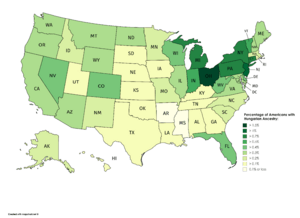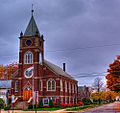Hungarian Americans facts for kids

This is a map showing states by the percentage of Americans they have claiming Hungarian Ancestry in 2018 according to the Census Bureau
|
|
| Total population | |
|---|---|
| 1,396,014 Around 0.43% of the U.S. population self-reported, 2018, American Community Survey 4,000,000 estimated total, including descendants |
|
| Regions with significant populations | |
| Ohio, New York, California, Pennsylvania, Texas, New Jersey, Michigan, Florida | |
| Languages | |
| American English, Hungarian, Yiddish, Romani | |
| Religion | |
| Roman Catholicism, Protestantism (Hungarian Reformed Church), Judaism, Greek Catholicism, Eastern Orthodoxy | |
| Related ethnic groups | |
| Hungarian Canadians, European Americans |
Hungarian Americans (in Hungarian: amerikai magyarok) are people living in the United States who have Hungarian family roots. This means their ancestors, or they themselves, came from Hungary. The U.S. Census Bureau reported in 2018 that about 1.4 million Americans said they were of Hungarian descent. However, when you include all people with any Hungarian background, the number is thought to be around 4 million!
Contents
Who are Hungarian Americans?
Hungarian Americans are a part of the rich mix of cultures in the United States. They are people whose families originally came from Hungary, a country in Central Europe. Many Hungarian Americans keep their traditions alive, like speaking the Hungarian language, celebrating Hungarian holidays, and enjoying Hungarian food.
Coming to America
Many Hungarians came to the United States in different waves.
Early Settlers
Some of the first Hungarians arrived in America as early as the 17th century. They were often explorers or people seeking new opportunities.
Big Waves of Immigration
The largest groups of Hungarian immigrants came in the late 1800s and early 1900s. Many were looking for work and a better life. They often found jobs in factories, mines, and farms.
After World War II
After World War II and especially after the 1956 Hungarian Revolution, more Hungarians came to the U.S. They were often seeking freedom and safety from political changes in their home country. These new arrivals brought their skills and culture, adding to the Hungarian American community.
Where They Live
Hungarian Americans live all across the United States. However, some states have larger Hungarian communities than others.
Major Communities
You can find many Hungarian Americans in states like Ohio, New York, Pennsylvania, and New Jersey. Cities such as Cleveland, New York City, and Toledo have historically been important centers for Hungarian culture. These areas often have Hungarian churches, cultural centers, and shops.
Hungarian American Culture
Hungarian Americans have worked hard to keep their unique culture alive. This includes their language, food, music, and traditions.
Language and Education
While most Hungarian Americans speak American English, many also speak Hungarian. There are schools and cultural programs that teach Hungarian to younger generations. This helps them connect with their heritage.
Food and Festivals
Hungarian cuisine is famous for dishes like goulash (a hearty stew), paprikash (chicken with paprika sauce), and chimney cake (a sweet pastry). Hungarian Americans often celebrate their heritage with festivals. These events feature traditional music, folk dances, and delicious food.
Religion
Many Hungarian Americans practice Roman Catholicism or Protestantism, especially the Hungarian Reformed Church. These churches often serve as important community hubs. They help people stay connected to their faith and cultural roots.
Contributions to America
Hungarian Americans have made many important contributions to the United States. They have excelled in various fields, from science and arts to business and sports.
Science and Innovation
Many Hungarian Americans have become famous scientists and inventors. Their work has helped shape modern technology and understanding.
Arts and Entertainment
In the arts, Hungarian Americans have contributed to music, film, and literature. Their talents have enriched American culture.
Business and Politics
Hungarian Americans have also played roles in business, helping to build industries and create jobs. Some have also been involved in politics, working to improve their communities and the country.
Images for kids
-
The Hungarian Cultural Garden among the Cleveland Cultural Gardens in Cleveland's Rockefeller Park
-
Hungarian Reformed Church. Taken in Homestead, Pennsylvania
-
Saint Elisabeth of Hungary Church in Smethport, Pennsylvania
-
The First Church of Christ, Unitarian of Lancaster, Massachusetts
-
Birmingham Historic District, Roughly bounded by Genesee, York, Esther, Magyar, Consaul, and the CSX and Norfolk Southern tracks in Toledo, Ohio
 | Jessica Watkins |
 | Robert Henry Lawrence Jr. |
 | Mae Jemison |
 | Sian Proctor |
 | Guion Bluford |











